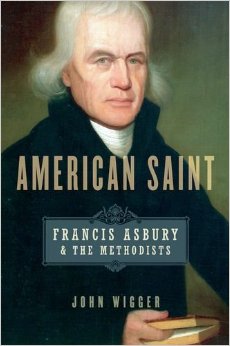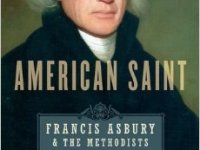 Lately I’ve been trying to gear up and plan for our Stewardship Campaign that we do every fall here at Asbury Memorial. And, like the other participants in our recent study on the life of Francis Asbury, I was simply astounded by the way in which Asbury viewed money and the way in which he lived. This blog posting will be the first in a series on Francis Asbury and what we in the church would now refer to as “stewardship.”
Lately I’ve been trying to gear up and plan for our Stewardship Campaign that we do every fall here at Asbury Memorial. And, like the other participants in our recent study on the life of Francis Asbury, I was simply astounded by the way in which Asbury viewed money and the way in which he lived. This blog posting will be the first in a series on Francis Asbury and what we in the church would now refer to as “stewardship.”
Even though Asbury’s time and context was very different from our own, there is still much that we can learn from his example and his life with regards to our membership vows in the United Methodist Church of supporting the church by “our prayers, our presence, our gifts, our service, and our witness.” As we’ve said time and time again, stewardship is about more than just money, and Francis Asbury’s life was a witness of faithfulness to this fact in every regard. In the spirit of our study, I will be sharing a paragraph or two from that book as it relates to stewardship in each of these posts. (These quotes are all taken from the book American Saint by Dr. John Wigger).
Though he spent his life traveling, he insisted on riding inexpensive horses and using cheap saddles and riding gear. He ate sparingly and usually got up at 4 or 5 a.m. to pray for an hour in the stillness before dawn. No one believed that Asbury was perfect, and even his most ardent supporters admitted that he made mistakes in running the church. He jealously guarded his episcopal authority, the one issue on which his critics gained traction. Yet his piety and underlying motivations seems genuine to almost everyone. This is crucial for understanding not only Asbury, but all of evangelical culture in this period (3).
I, for one, am terribly convicted by two things in this short paragraph. First, I think about how he traveled an estimated 130,000 miles on a horse, and still insisted on riding inexpensive horses and using cheap saddles and riding gear. Most of us would gravitate to a perspective more along the lines of justifying some comfort or luxury with our transportation choices if we had to travel that much. “I’m on the road a lot, so I really need a little bit of luxury to help me make it through.” I imagine that voice in your head might suggest something along similar lines. But Asbury didn’t care so much about his comfort on the road. He placed the kingdom of God and “preparing the way of the Lord” far before the comforts of this life. How might this truth be applied in your life?
Secondly, I am terribly convicted by Asbury’s diet. In the wake of so many fad diets and other things that are unhealthy in our world that we consume on a daily basis, perhaps we could all benefit from “The Asbury Diet.” I would imagine it might look something like getting up at 5 a.m. and praying for an hour, followed by a regimented session of horseback riding, followed by “eating sparingly.” I think it was easier for Asbury to eat sparingly because he was always reliant on someone else to provide him with his nutritional needs. He had no home in which to lay his head, and thus he had no kitchen. It may seem strange to think of the foods we eat as being related to stewardship, but think about it for a moment. How many times do you and your family eat out each week? How much money do we spend each month on processed junk food at the grocery store? Wouldn’t some of that money be better used in helping those with needs greater than our own? If I just ate smaller portions of food or if I chose to not go out to eat one time a month less than I do now then I could have more money that could be used to help those with no food. How might this truth be applied in your life?
Stewardship is about so much more than what we do with our money. I encourage us to take a moment this week and reflect on the ways in which we all might become better stewards of everything God has given to us. And who knows, maybe I can become a millionaire by publishing “The Asbury Diet.” That would be one heck of a tithe!
